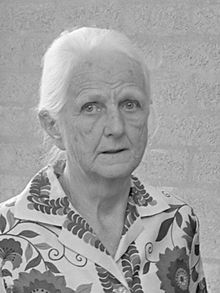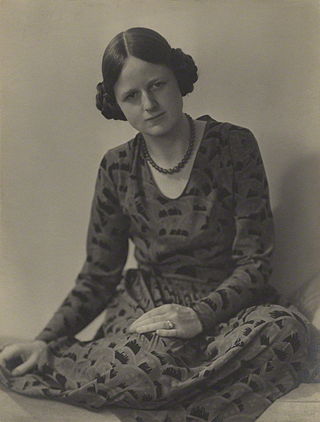Loading AI tools
English economist (1903–1983) From Wikipedia, the free encyclopedia
Joan Violet Robinson FBA (née Maurice; 31 October 1903 – 5 August 1983) was a British economist known for her wide-ranging contributions to economic theory. One of the most prominent economists of the century, Robinson incarnated the "Cambridge School" in most of its guises in the 20th century. She started out as a Marshallian, became one of the earliest and most ardent Keynesians after 1936, and ended up as a leader of the neo-Ricardian and post-Keynesian schools.
Joan Robinson | |
|---|---|
 Robinson in 1973 | |
| Born | Joan Violet Maurice 31 October 1903 Surrey, England |
| Died | 5 August 1983 (aged 79) Cambridge, England |
| Academic career | |
| Field | Monetary economics |
| School or tradition | Post-Keynesian economics |
| Influences | Adam Smith, Karl Marx, John Maynard Keynes, Piero Sraffa, Michał Kalecki |
| Contributions | Joan Robinson's growth model Amoroso–Robinson relation Monopsony theory |
Before leaving to fight in the Second Boer War, Joan's father, Frederick Maurice, married Margaret Helen Marsh, the daughter of Frederick Howard Marsh, and the sister of Edward Marsh, at St George's, Hanover Square.[1] Joan Violet Maurice was born in 1903, a year after her father's return from Africa, the third of five siblings.[2]
Joan Maurice studied economics at Girton College, Cambridge.[3] She completed her studies in 1925 but due to Cambridge University's refusal to grant degrees to women until 1948, she did not formally graduate. Following her marriage to economist Austin Robinson the next year, she became known as Joan Robinson.[2]
The couple moved to India shortly after their marriage where Joan Robinson became interested in the relations between the British Raj and the Indian princely states and wrote a report on the subject. This time in India was a formative experience on Robinson, shaping her future research interest in both the country and her studies of developing economies.[2] In 1928, the couple returned to Cambridge and Robinson started teaching in the early 1930s as a Junior Assistant Lecturer.[4]
Robinson crossed swords with the economist Marjorie Hollond, Girton's director of studies, over the teaching of economics. Robinson wanted to teach the latest economic theories whereas Hollond believed that they were as yet unproven.[5] In 1937, Robinson became a lecturer in economics at the University of Cambridge.[6] She joined the British Academy in 1958 and was elected a fellow of Newnham College in 1962. In 1965 she assumed the position of full professor and fellow of Girton College. In 1979, just four years before she died, she became the first female honorary fellow of King's College.[7]
As a member of "the Cambridge School" of economics, Robinson contributed to the support and exposition of Keynes' General Theory, writing especially on its employment implications in 1936 and 1937 (it attempted to explain employment dynamics in the midst of the Great Depression).
During World War II, Robinson worked on a few different Committees for the wartime national government. During this time, she visited the Soviet Union as well as China, gaining an interest in underdeveloped and developing nations.
Robinson was a frequent visitor to Centre for Development Studies (CDS), Thiruvananthapuram, India. She was a visiting fellow at the Centre in the mid-1970s.[8] She instituted an endowment fund to support public lectures at the centre. She was a frequent visitor to the centre until January 1982 and participated in all activities of the centre and especially student seminars. Professor Robinson donated royalties of two of her books (Selected Economic Writings, Bombay: Oxford University Press, 1974, Introduction to Modern Economics (jointly with John Eatwell), Delhi; Tata McGraw Hill, 1974) to CDS.
Robinson also made several trips to China, reporting her observations and analyses in China: An Economic Perspective (1958), The Cultural Revolution in China (1969), and Economic Management in China (1975; 3rd edn, 1976), in which she praised the Cultural Revolution. In October 1964, Robinson also visited North Korea, which was effectively a single-party Communist state, and wrote in her report "Korean Miracle" that the country's success was due to "the intense concentration of the Koreans on national pride" under Kim Il Sung, "a messiah rather than a dictator."[9] She also stated in reference to the division of Korea that "[o]bviously, sooner or later the country must be reunited by absorbing the South into socialism."[10] During her last decade, she became more and more pessimistic about the possibilities of reforming economic theory, as expressed, for example, in her essay "Spring Cleaning."[11]
Robinson was a strict vegetarian. She slept in a small unheated hut at the bottom of her garden all year round.[12]

In 1933, her book The Economics of Imperfect Competition, Robinson coined the term "monopsony", which is used to describe the buyer converse of a seller monopoly. Monopsony is commonly applied to buyers of labour, where the employer has wage setting power that allows it to exercise Pigouvian exploitation[13] and pay workers less than their marginal productivity. Robinson used monopsony to describe the wage gap between women and men workers of equal productivity.[14]
In 1942, Robinson's An Essay on Marxian Economics famously concentrated on Karl Marx as an economist, helping to revive the debate on this aspect of his legacy.
In 1956, Robinson published her magnum opus, The Accumulation of Capital, which extended Keynesianism into the long run.
In 1962, she published Essays in the Theory of Economic Growth, another book on growth theory, which discussed Golden Age growth paths. Afterwards, she developed the Cambridge growth theory with Nicholas Kaldor. She was elected a Foreign Honorary Member of the American Academy of Arts and Sciences in 1964.[15]
In 1964 she made important contributions to the field of economic methodology. She explored the philosophical foundations of economic analysis in her influential book Economic Philosophy, criticizing traditional methodological approaches and arguing in favor of a more diverse and interdisciplinary approach to economics. She promoted a more practical and historically informed approach that considers the social and institutional environment within which economic phenomena occur.
In 1984, Robinson was elected to the American Philosophical Society.[16]
Near the end of her life, she studied and concentrated on methodological problems in economics and tried to recover the original message of Keynes' General Theory. Between 1962 and 1980, she wrote many economics books for the general public. Robinson suggested developing an alternative to the revival of classical economics.
The Cultural Revolution in China is written from the perspective of trying to understand the thinking that lay behind the revolution, particularly Mao Zedong's preoccupations. Mao is seen as aiming to recapture a revolutionary sense in a population that had known only, or had grown used to, stable Communism, so that it could "re-educate the Party" (pp. 20, 27); to instill a realisation that the people needed the guidance of the Party as much as the other way round (p. 20); to re-educate intellectuals who failed to see that their role in society, like that of all other groups, was to 'Serve the People' (pp. 33, 43); and finally to secure a succession, not stage-managed by the Party hierarchy or even by Mao himself but the product of interaction between a revitalised people and a revitalised Party (p. 26).
On the whole, the book emphasises the positive aspects of Mao's "moderate and humane" intentions (p. 19) rather than the "violence and disorder" that broke out, we are told, "from time to time", occurrences "strongly opposed" (ibid.) to Mao's wishes. Robinson recognises and appears to endorse a revision to classical Marxism in Mao's view of the relation of base to superstructure: "On the classical view, there is one-way determination between base and superstructure but Mao shows how the superstructure may react upon the base: Ideas may become a material force" (p. 12). She acknowledges that "Old-fashioned Marxists might regard this as a heresy, but that is scarcely reasonable" (ibid.).
In June 2019, the United States Supreme Court used Robinson's monopsony theory in its decision for Apple v. Pepper.[17] Justice Brett Kavanaugh delivered the majority opinion, stating Apple can be sued by application developers, "on a monopsony theory."[17]
In 1945, she was appointed to the Ministry of Works' Advisory Committee on Building Research, the only economist and the only female member of that committee.[18]
In 1948, she was appointed the first economist member of the Monopolies and Mergers Commission.[19]
In 1949, she was invited by Ragnar Frisch to become the vice-president of the Econometric Society but declined by saying she that could not be part of the editorial committee of a journal that she could not read. [citation needed]
During the 1960s, she was a major participant in the Cambridge capital controversy alongside Piero Sraffa.
At least two students who studied under her have won the Sveriges Riksbank Prize in Economic Sciences in Memory of Alfred Nobel; they are Amartya Sen[20] and Joseph Stiglitz.[21] In his autobiographical notes for the Nobel Foundation, Stiglitz described their relationship as "tumultuous" and Robinson as unused to "the kind of questioning stance of a brash American student"; after a term, Stiglitz therefore "switched to Frank Hahn".[22] In his own autobiography notes, Sen described Robinson as "totally brilliant but vigorously intolerant."[23]
She also influenced Indian Prime Minister Manmohan Singh which altered his approach towards economic policies.
Robinson never received a Nobel Prize for her contribution to economics. She was widely anticipated to receive the prize for Economics in 1975, and Rachel Reeves described her as 'the most famous economist not to be awarded the Nobel Prize'.[24][25] Of all 93 recipients of the Nobel Prize in Economic Science, only 10 winners have been cited more widely than Robinson.[26] It is widely assumed that the committee's oversight of Robinson was due to her outspoken support of Mao's economic policies in China, but others have argued this is instead due to sexism within the awarding committee.[27][28]
Robinson's father was Frederick Maurice, her mother was Margaret Helen Marsh. The distinguished London surgeon and Cambridge academic Howard Marsh was Joan Robinson's maternal grandfather.
Joan Maurice married fellow economist Austin Robinson in 1926.[29] They had two daughters, Ann and Barbara.[2][29]

In 2016, the Council of the University of Cambridge approved the use of Robinson's name to mark a physical feature within the North West Cambridge Development.[30]
In April 2024, a blue plaque was erected in Kensington Gardens, London, to honour Robinson's life and work. English Heritage, the awarding organisation, described her as 'one of the first women to achieve academic prominence in the discipline of economics'.[31][2][32]
The economics society of Girton College, Cambridge is named the Joan Robinson Society.[33]
Seamless Wikipedia browsing. On steroids.
Every time you click a link to Wikipedia, Wiktionary or Wikiquote in your browser's search results, it will show the modern Wikiwand interface.
Wikiwand extension is a five stars, simple, with minimum permission required to keep your browsing private, safe and transparent.